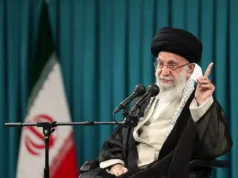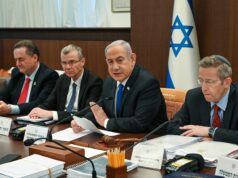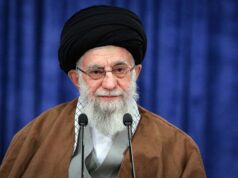In the academic specialty known as Middle Eastern studies exists a bevy of departments and professors competing for the title of most politicized and most funded by occult sources. But one university stands out for its persistent efforts to undermine a once-proud discipline by hiring academics of questionable accomplishments and forcing on its students a worldview more typically found in that region’s worst dictatorships.
Columbia Unbecoming
Columbia University, the subject of a movie (Columbia Unbecoming) documenting professors engaging in America-bashing, Israel-bashing, and (President George W.) Bush-bashing, was home base for the late Palestinian advocate and ideologue Edward Said, the architect of the speedy descent into irrelevance that has come to define so much of Middle East studies. Columbia now hosts a coterie of academics known for bullying students with pro-Israel sympathies, openly supporting Palestinian terrorist groups, and denying the historic existence of the ancient kingdom of Israel.
Said’s legacy, a toxic mixture of political correctness and post-modernism, is considered standard fare in most Middle East studies departments, both in the U.S. and abroad. More an attempt at indoctrination than education, “Saidism” has resulted in low-grade publications rife with anti-America, anti-Israel, and anti-Western screeds.
Columbia’s latest celebration of Professor Said took place on November 7-8, 2008, when it hosted a conference entitled “Orientalism from the Standpoint of its Victims.” Featuring a cast of characters whose sole purpose in life seems to be the defamation of America and Israel, the conference predictably featured empty diatribes, accusations of imperialism, and attacks on critical scholars concerned with objective truth in this corrupt field.
Creeping Like Ivy
Unfortunately, Columbia is just the tip of the sand dune. Other Ivy League schools are beset by similar problems.
In 2007, Brown University staged a workshop titled “The Study of the Middle East and Islam: Challenges After 9-11,” which purported to explore “some of the challenges facing American higher education as it seeks to… help foster a greater understanding in this country of the Middle East and Muslim world.” Despite these lofty goals, the presenters were mostly academics hostile to the U.S.-led war on terrorism, to its ally, Israel, and to higher education efforts to combat radical Islam on campus.
In fact, the workshop organizers were signatories to a 2002 open letter claiming that the impending Iraq War would give Israel cover to commit ethnic cleansing. Present at the conference was University of Michigan professor Juan Cole, the past president of the Middle East Studies Association (MESA) and coiner of the term “Zionofascists.” There were no pro-Israel speakers in attendance, and two student groups, Hillel and Brown Students for Israel, were apparently not invited by design.
In September 2008, Yale’s Council on Middle East Studies (CMES), a recipient of Title VI federal education funding, held a conference on “opportunities and challenges” in the Middle East. Invited participants included: keynote speaker Robert Malley, a vocal proponent of the need to recognize Hamas; Marwan Khawaja, an American University of Beirut demographer who signed an anti-Israel, pro-Hezbollah letter during the 2006 war; Avi Shlaim, an Israeli revisionist historian who favors an arms embargo and economic sanctions against Israel; and Trita Parsi, the head of a lobbying group in Washington, D.C. that supports the radical Islamist regime in Iran.
Petrodollars
The corruption in America’s schools is abetted by an influx of Gulf state petrodollars that secure endowed chairs and research centers. Today, Arab-funded Middle East studies departments across America indoctrinate academics as well as intelligence and foreign service officers charged with charting America’s course in a dangerous world.
In 2005, Georgetown University was the recipient of $20 million from Prince Alwaleed bin Talal of Saudi Arabia. Bin Talal attempted to offer New York Mayor Rudy Giuliani $10 million after September 11, 2001, while blaming America’s foreign policy as the reason for the attacks. (Giuliani famously turned down the condescending offer.) The Georgetown gift put bin Talal’s name on the door of the university’s Center for Muslim-Christian Understanding, which is run by supporters of the Muslim Brotherhood and of the Palestinian Islamic Jihad.
According to one recent study by Professor Jay Greene of the University of Arkansas, between 1995 and 2008 Arabian Gulf states were the source of 16 percent of all foreign gifts and contracts to U.S. universities. Of this amount, $88 million in gifts went to academics on 14 important U.S. college campuses. The effect of these gifts was to give partisans of the Gulf countries (and their varied political and religious interests) a bigger megaphone to shape the research, hiring, and promotion of the next wave of Middle East experts. The gifts also facilitated the acceptance of students from Gulf countries for training at these universities. Among the biggest recipients: the University of Arkansas, Georgetown University, George Washington University, and Harvard University.
The impact of these gifts on Middle East studies can be profound. According to Greene:
Anyone wishing to be a successful graduate student and eventually a professor of Middle Eastern Studies has to know that if they stay away from certain questions, like the abuses of authoritarian Arab regimes, and focus on other questions, like alleged shortcomings of Israel or the U.S., they might get several million dollars dropped in their lap. In addition, the students of the favored professors who receive millions of dollars are more likely to advance further in the profession.
Enter ASMEA
The bad news is that the corruption continues in many Middle Eastern studies departments nationwide. The good news is that reform is on the way, in the form of the Association for the Study of the Middle East and Africa (ASMEA).
Created under the leadership of Professors Bernard Lewis of Princeton and Fouad Ajami of Johns Hopkins, the organization seeks to fill the void caused by the absence of free inquiry and honest scholastic debate on Middle East research within academia. An alternative to the status quo, ASMEA vigorously defends academic freedom and promotes superior scholarship by providing professors and students with research and teaching resources, opportunities to publish and share their knowledge, and the ability to interact with scholars in an open atmosphere where ideas are judged on their merits.
After one year, the organization already has 750 members who hold degrees in 35 different disciplines, hail from 40 countries, and are affiliated with 300 universities throughout the world. Nonpartisan and interdisciplinary, ASMEA is quickly becoming a powerful alternative to the Middle Eastern Studies Association, which has come under fire in recent years for corruption and “groupthink” associated with the larger field.
In spring 2008, some 250 scholars, diplomats, military officers, and others attended the inaugural annual ASMEA conference. Instead of the usual tirades and scathing rhetoric that dominates MESA conferences, this conference featured thoughtful critiques and substantive scholarship on topics of immediate and profound importance including the proliferation of Middle East terrorism, the alarming growth of Islamism, and the continued hostility to democratic ideals in the Middle East. These topics and others were freely discussed without the suffocating political correctness common within the academy.
Slow and Steady Progress
In what can only be seen as a positive sign, ASMEA’s critics already are sniping away. The aforementioned Juan Cole claims that ASMEA is “exclusively ideological” and just “for people on the right.” Laurie Brand, professor of international relations at the University of Southern California, says that its directors are “at the forefront of the neoconservative support group for the [Bush] administration.” Bassam Haddad, director of Middle East Studies at George Mason University, asserts that ASMEA is “a response, rather than an organic expression of a desire to learn.” Such statements only underscore the anti-intellectual nature of the field and the necessity of ASMEA’s approach.
The early success of ASMEA is exposing the flaws of “Saidism” and the tactics used by its followers while restoring balance to Middle East scholarship on campuses across the country. In the process, ASMEA is creating a new dawn in this critical field for scholars and those who rely upon their work.
Professor Michael I. Krauss teaches torts, legal ethics, and jurisprudence at George Mason University School of Law in Arlington, VA.





